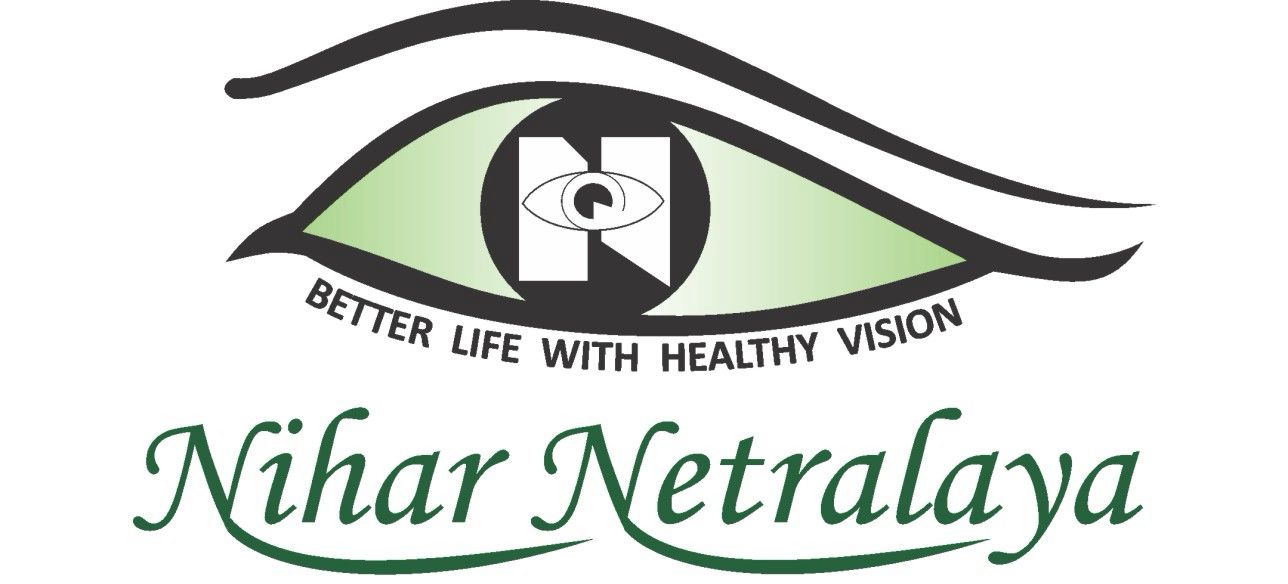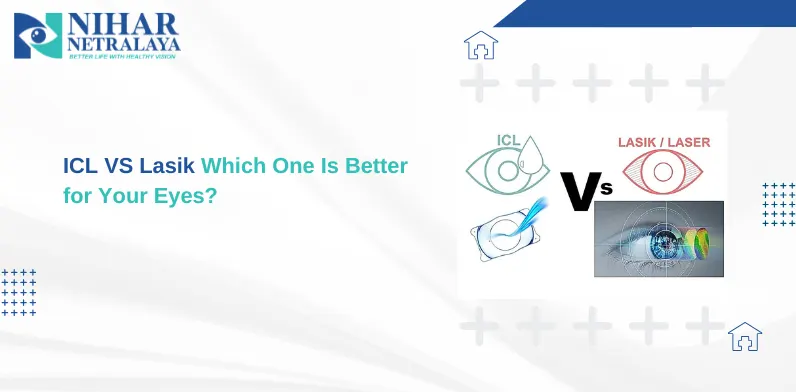The World Health Organization notes that over 2.2 billion people globally have vision impairment, mainly due to uncorrected refractive errors. Many people go for vision correction surgeries like LASIK and ICL to reduce dependence on glasses or contacts.
“Is LASIK painful?” or “Is ICL safer than LASIK?” “ICL vs LASIK, which is better?” “How about ICL vs LASIK safety?’ – are some common questions asked to us. As a doctor, I assure you—both are advanced, safe and effective when done on the right candidate. Today we will share details on ICL vs Lasik; Lasik eye surgery age limits, etc and guide you through what’s best for your unique eyes.
What is LASIK Eye Surgery?
LASIK eye surgery is a safe and very commonly undertaken laser eye surgery procedure. Doctors reshape the cornea to improve eye-sight and this eliminates the need for using glasses or contacts. A special laser removes precise amounts of tissue to correct nearsightedness (Myopia), farsightedness (Hypermetropia) or Astigmatism. Candidates must usually be over 18—the typical LASIK eye surgery age limit—with stable eye sight for at least a year. According to WHO-aligned standards, a minimum corneal thickness of about 500 microns is essential to ensure safe reshaping. Those with thin corneas, eye diseases or uncontrolled diabetes may often not be suitable for LASIK.
What is ICL Eye Surgery?
To understand this in simple words you need to imagine a soft, contact lens placed with the poor lens of your eyes, inside your eye to help you see clearly. ICL stands for Implantable Collamer Lens which is a type of intraocular lens placed between your iris and natural lens.
Unlike LASIK, which uses a laser to permanently reshape your cornea, ICL saves your eye’s original structure. Thus it is especially suitable for those with thin corneas or dry eyes (not suitable as LASIK candidates). A key benefit is reversibility—ICL can be removed if needed. ICL eye surgery offers a safer alternative to lasik eye surgery plus it is the better eye surgery for myopia whether that is moderate or severe. Studies show it maintains better night vision clarity and corneal health compared to LASIK in some patients.
ICL vs LASIK Which is Better?
| Aspect | ICL Eye Surgery | LASIK |
| How it works | A tiny lens is implanted inside your eye, behind the cornea, to correct your eye-sight. | The cornea is reshaped with a laser to improve vision clarity. |
| Best for | People with thin corneas or high prescriptions. | Those with healthy corneas and moderate prescriptions. |
| Recovery | Takes a bit longer, usually about 1-2 weeks. | Quick recovery, most feel better in a few hours. |
| Risks | Slight chance of cataracts or higher eye pressure. | Risk of dry eyes, glare, or halos, but usually temporary. |
| ICL vs Lasik Safety | ICL eye surgery is generally safe, but it’s more suitable for specific cases. | LASIK has a strong safety record for many people. |
Best Vision Correction for Myopia – How Does ICL Better Upon LASIK?
When dealing with high myopia (nearsightedness), it’s important to choose the right type of eye surgery for myopia to achieve the best possible results.
For individuals with high myopia, ICL eye surgery typically performs better. Here’s why: In high myopia, the cornea may not be thick enough to undergo LASIK safely. Or the myopia may be beyond medical limits or severe for LASIK to fully correct it. What makes ICL eye surgery more suitable for myopia or severe myopia? Because it simply places the lens behind the iris, in front of the natural lens of the eye, rather than reshaping the cornea. This means it can give refractive error treatment without worrying about corneal thickness, shape or even the Lasik eye surgery age limit.
ICL vs LASIK: Risks and Complications
LASIK is widely known for its quick recovery and effective laser correction. But like any other surgery, it has its own small risks.If you have the best eye expert near you, you need not worry about the same! But still we are sharing the minor risks involved.
- Common issues include dry eyes, which can last for a few months
- Flap problems during the cornea reshaping process
- Glare or halos around lights, especially at night.
- LASIK usually isn’t suitable for autoimmune disorders or pregnancy due to healing unpredictability.
- LASIK permanently thins the cornea, which may not suit future eye surgeries or trauma.
On the other hand, ICL eye surgery carries a rare risk of infection or an increase in eye pressure. This will need medication or further treatment/ annual monitoring for cataract formation, even in young adults. Rare risks that can be easily managed by eye surgeons. So consult the best eye doctors, to get an idea of which one to go for.
ICL vs LASIK – Who Should Consider What and Why?
- LASIK eye surgery is ideal for people aged 18–40, but only if their vision has been stable for at least a year. This is because eye tissue is softer at a younger age.
- ICL eye surgery is more trusted especially for younger patients needing stronger correction.
- ICL is better for very high prescriptions (above -8.0 diopters) where LASIK may not be safe or effective. But, LASIK is not safe for people with thin corneas, dry eyes or very high prescriptions.
- LASIK might not be allowed for people with keratoconus or autoimmune disorders.
- People with jobs that involve physical contact or risk of eye injury (like athletes or military) may prefer ICL, since it doesn’t thin the cornea.
ICL vs LASIK- Recovery Time and Results
- LASIK heals faster (1–2 days); ICL recovery may take up to a week, as the intraocular healing needs time.
- ICL gives better night contrast; LASIK may cause glare or halos.
- LASIK risks corneal ectasia in thin corneas; ICL avoids this.
- ICL carries risk of cataract or raised eye pressure; LASIK does not.
- Both need lifelong monitoring for retinal health post-surgery.
CTA:
Choosing between ICL and LASIK hinges on your unique eye health. So for us, there is actually nothing like – ICL vs LASIK which is better, because we always say, SCHEDULE AN APPOINTMENT for a detailed consultation with a certified ophthalmologist. We will help you uncover the most suitable, vision-restoring path for your eyes’ refractive error treatment.
Image Source: ICL vs Lasik
FAQs:
No, LASIK is not painful. You may feel mild pressure during the procedure, but numbing drops ensure you don’t feel pain. Some discomfort or dryness may be felt after the procedure, which usually resolves quickly.
Both surgeries are safe when performed on the right candidate. ICL is considered safer for patients with high prescriptions, dry eyes, or thin corneas, while LASIK is safe and effective for those with normal corneal thickness and moderate prescriptions.
ICL generally costs more than LASIK because it involves an implantable lens and is a more intricate intraocular procedure. However, the long-term benefits may outweigh the cost for patients unsuitable for LASIK.
The typical LASIK eye surgery age limit is 18 years with stable vision for at least one year. ICL is also considered for patients above 18 years but may be preferred in younger patients needing higher vision correction.
In some cases, ICL can still be an option even if LASIK has been done before, especially for residual refractive errors. However, a thorough eye evaluation is essential.
Studies suggest ICL may offer better night vision clarity than LASIK, especially in patients with higher prescriptions or night glare issues.


